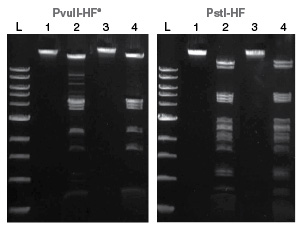上海金畔生物科技有限公司代理New England Biolabs(NEB)酶试剂全线产品,欢迎访问官网了解更多产品信息和订购。
产品信息
Thermolabile Proteinase K is an engineered, subtilisin-related serine protease that will hydrolyze a variety of peptide bonds. It preferentially cleaves the peptide bond at the carboxyl side of aliphatic or aromatic amino acid residues. However; the specificity of Thermolabile Proteinase K can be broad.
Thermolabile Proteinase K (TLPK) can be completely inactivated by incubation at 55°C for 10 minutes, which allows for subsequent enzymatic steps in the same reaction vessel. Figure 1 shows that the activity of restriction endonucleases, including heat-stable endonucleases, can be completely abolished using TLPK.

产品来源
Cloned from Engyodontium album (formerly Tritirachium album), mutagenized to increase thermolability of the enzyme and expressed in Pichia pastoris.
- 产品类别:
- Proteases Products,
- Total RNA Extraction & Purification Products,
- RNA Extraction and Purification,
Nucleic Acid Purification Products
- 应用:
- PCR & Reaction Cleanup,
- Protein Analysis Tools,
- Protein Digestion,
- Proteomics,
DNA Amplification, PCR & qPCR
-
产品组分信息
本产品提供以下试剂或组分:
NEB # 名称 组分货号 储存温度 数量 浓度 -
P8111S -20 Thermolabile Proteinase K P8111SVIAL -20 1 x 0.25 ml 120 units/ml
-
-
特性和用法
单位定义
One unit is defined as the amount of enzyme required to release 1.0 µmol of 4-nitroaniline per minute from N-Succinyl-Ala-Ala-Pro-Phe-p-nitroanilide at 25°C, in a total reaction volume of 105 µL.
贮存溶液
20 mM Tris-HCl
1 mM CaCl2
50% Glycerol
pH 7.4 @ 25°C热失活
55°C for 10 minutes
分子量
实际: 29 kDa
单位活性检测条件
A series of dilutions of Thermolabile Proteinase K are incubated with 0.25 mM N-Succinyl-Ala-Ala-Pro-Phe-p-nitroanilide in 0.1% SDS, 0.1% Triton X-100, 20 mM Tris-HCl, 5 mM CaCl2, 50 mM NaCl (pH 8.0 @ 25°C) in a 105 μl reaction. The reaction mix is incubated at 25°C. Liberation of p-nitroaniline is detected by real-time UV spectroscopy at 405 nm.
-
优势和特性
Features
- Heat inactivated following incubation at 55°C for 10 minutes.
- Isolation of plasmid and genomic DNA and RNA
- Inactivation of RNases, DNases and various other enzymes in reaction workflows
- PCR purification
-
相关产品
相关产品
- p8107-proteinase-k-molecular-biology-grade
-
注意事项
- Active in a wide range of buffers. It is highly active between pH 7.0 and 9.5 and temperatures 20-40°C. It is active in chelating agents such as EDTA up to 10 mM.
- Thermolabile Proteinase K is stable for at least 2 years at –20°C. No loss of activity is observed after 10 freeze-thaw cycles.
- Thermolabile Proteinase K is highly active over a broad pH range (7.0 – 9.5) and a wide temperature range (20 – 40°C).
- Thermolabile Proteinase K is active in chelating agents such as EDTA up to 10 mM.
- Enzyme activity is stimulated in up to 1% SDS and no inhibition is observed in SDS concentrations up to 2.5% or Triton X-100 concentrations up to 1.5%.
- Thermolabile Proteinase K activity is inhibited by urea concentrations greater than 2 M.
操作说明、说明书 & 用法
-
操作说明
- Thermolabile Proteinase K Typical Reaction Protocol
工具 & 资源
-
选择指南
- Protease Selection Chart
FAQs & 问题解决指南
-
FAQs
- How is Thermolabile Proteinase K different from Proteinase K, Molecular Biology Grade?
- Can I use Thermolabile Proteinase K for molecular biology applications?
- Should I switch from Proteinase K, Molecular Biology Grade to Thermolabile Proteinase K?
- If I switch from Proteinase K, Molecular Biology Grade to Thermolabile Proteinase K, should I use the same amount of enzyme?
- How do I heat inactivate Thermolabile Proteinase K?
- What buffer should I use to dilute Thermolabile Proteinase K?
- What is the optimal reaction buffer for Thermolabile Proteinase K?
- What is the optimal incubation temperature and time?
- Is Thermolabile Proteinase K compatible with EDTA, Triton X-100, SDS, DTT and/or Urea?
- Is Thermolabile Proteinase K active in common NEB buffers?
- Is Thermolabile Proteinase K active in the presence of metal ions?
- Why is the unit definition assay for Thermolabile Proteinase K (NEB #P8111) different from the unit definition assay for Proteinase K, Molecular Biology Grade (NEB # P8107)?
- What is the activity if Proteinase K, Molecular Biology Grade if subjected to the unit definition assay used for Thermolabile Proteinase K?
